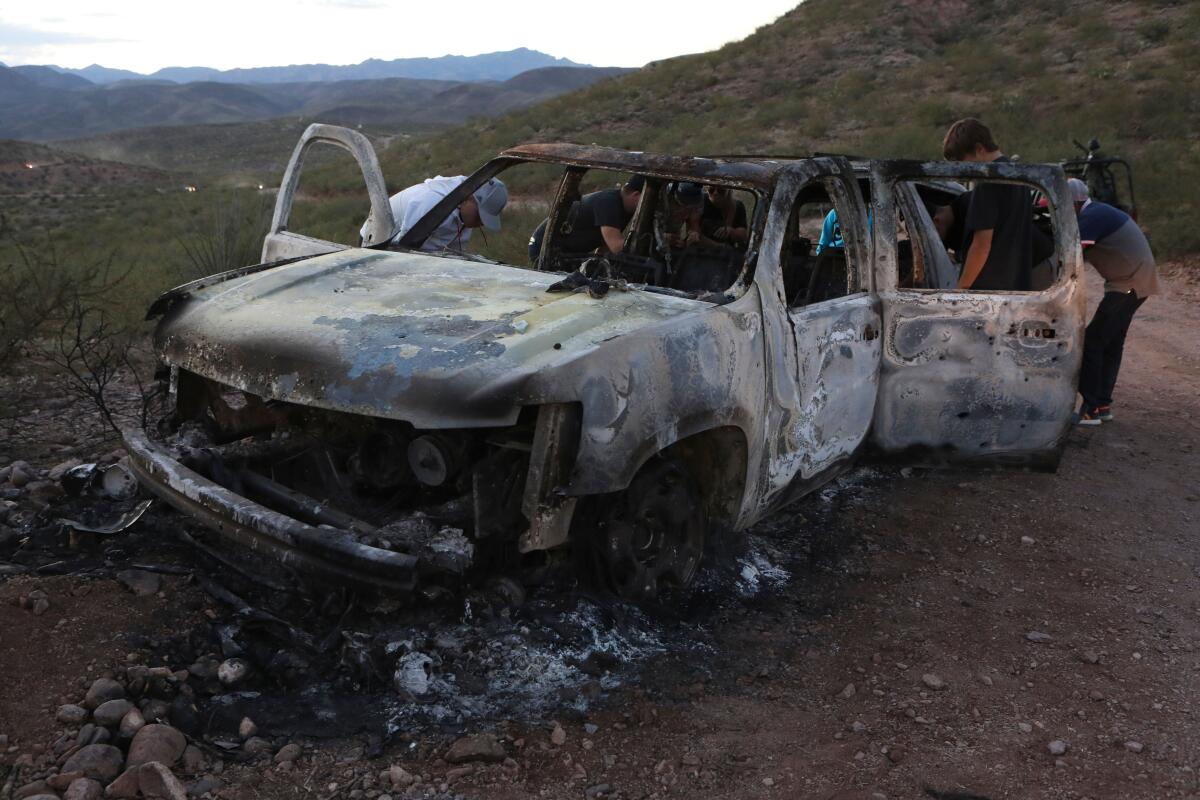Editorial: Trump doesn’t have the answer to cartel violence, but neither does Mexico’s president

- Share via
President Trump’s response to the massacre in Sonora, Mexico, of three women and six children at the hands of suspected drug cartel thugs was all too typical. He took to Twitter — and offered to send U.S. troops across the border to set things right.
“If Mexico needs or requests help in cleaning out these monsters,” Trump tweeted, “the United States stands ready, willing & able to get involved and do the job quickly and effectively. The great new President of Mexico has made this a big issue, but the cartels have become so large and powerful that you sometimes need an army to defeat an army!”
But armies don’t appear to be the answer. With U.S. funding and other assistance, the Mexican military fought violent drug cartels for more than a decade. Despite that, Mexico is now an even more dangerous and violent place, a fact driven home by the most recent attack. The country’s homicide rate reached record highs this year.
Even setting aside the sensitive issue of Mexican sovereignty, it’s hard to see how U.S. troops could “quickly and efficiently” end a problem that has been plaguing Mexico for decades.
No thanks, Mexican President Andres Manuel Lopez Obrador said to Trump’s offer.
“We don’t think that by opening fire, massacring, using force, blood and fire, we will resolve this problem,” Lopez Obrador told reporters.
Mexicans elected AMLO, as Lopez Obrador is popularly known, in large part because he promised to reduce the nation’s alarming homicide rate and stem the drug-related violence by employing a different and more effective response. He would eliminate corruption (in part by setting a non-corrupt example for Mexican officials to follow). He would legalize marijuana and some other drugs, weakening the underground economy that sustains the cartels. He would create a national guard. He would offer welfare payments to entice the poor away from lives of crime. And he would refrain from the most violent responses to crime.
It may be too early for a verdict on his program, given that Lopez Obrador has been in office only since July 2018. But so far, his approach doesn’t seem to be working any better than “force, blood and fire.”
On this side of the border, many U.S. officials had asserted that the conviction of notorious Sinaloa cartel leader Joaquin “El Chapo” Guzman in a Brooklyn courtroom and his sentencing in July to a life term plus 30 years had finally broken the cartels’ hold on Mexico. Guzman had previously escaped Mexican jails, but this time he was convicted in the U.S. and — perhaps mirroring Trump’s tweeted implication that the U.S. could succeed where Mexico could not — that was surely the end of it.
But the cartel’s operations continued unabated. Lopez Obrador was embarrassed by a shootout between his new National Guard (among other law enforcement officials) and suspected cartel members that left seven dead and forced residents in Culiacan to go into hiding during the confrontation. The goal of the raid — the arrest of Guzman’s son, Ovidio Guzman Lopez, for extradition to the U.S. — was ultimately abandoned.
The latest incident was especially gruesome. The victims, members of a fundamentalist Mormon sect living in Mexico with dual U.S. and Mexican citizenship, were members of a convoy traveling between Sonora and Chihuahua.
Despite an arrest, there remained some confusion about just which cartel (or other assailant) was responsible for the attack, and whether the assailants believed the convoy to be part of a rival organization.
But the attack demonstrates that violent gangs are so far unimpressed by Lopez Obrador’s new policy. It’s entirely possible that they instead feel empowered, given the precedent of Culiacan fiasco. The government may have signaled that it will back down to avoid violence. The cartels have sent no such signal.
Had Trump’s offer been a bit less bombastic and more thoughtful, the Mexican president might have been more inclined to seek U.S. assistance. No Mexican approach to dealing with violent gangs is likely to succeed without some kind of participation north of the border. That’s in large part because the U.S. market for illegal narcotics is what keeps the traffickers in business. It’s also because experience shows that intelligence, expertise, extraditions and U.S. court proceedings can all be effective responses to violence and drug trafficking, even if they can’t by themselves end the problem.
Meanwhile, Lopez Obrador may be running out of time to show Mexico’s increasingly beleaguered population that his own prescription for dealing with the violence can work.
More to Read
A cure for the common opinion
Get thought-provoking perspectives with our weekly newsletter.
You may occasionally receive promotional content from the Los Angeles Times.










